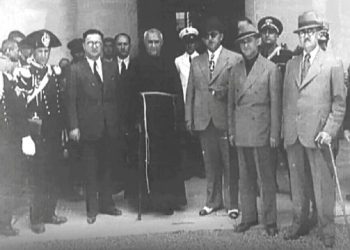From Bashkim Trenova
MYTH-MYSTICISM, VICTIMOMANIA, RACISM AND SERBONOSTALGIA
ALBANIANS ACCORDING TO THE SERBS
(THE EASTERN CRISIS AND THE BALKAN WARS)
Memorie.al / “Serbs are descended from the Slavs, a large number of tribes who gave life to the Slavic peoples. Knowledge about the origins of the history of the Slavs is modest and not so clear. Their name appears for the first time in the 6th century AD, when Byzantine writers start talking about the Slavs….”! (Dushan Bataković, Milan St. Protic, Nikola Samardžić, Aleksandër Fotic. History of the Serbian People. L’Age d’Homme. Lausanne. 2005. Pg. 3.)
Continues from last issue
****
Dubravka Stojanović – historian at the Institute of New History of Serbia, teaches at the Department of Contemporary General History, Department of History, Faculty of Philosophy in Belgrade:
Loss is the key to the homogenization of the nation. This defeat and the victims are important, because with the weakest, empathy is created. The victim has every right in advance.
It is not a question of facing the defeat of 1999, but of 1389. We have not faced it and, if we do not face it, we must stop moaning. We live in the frozen year 1389 and this time does not pass. This time has no dynamics, it remains and we remain in that time. If we were to accept the defeat of 1389, we would agree that history is not closed, that it is dynamic, that some people are responsible for it. Let them bear the responsibility. Frozen Kosovo serves to ensure that we do not see, understand or hear anything. That’s why we don’t want fusion. (1)
1 – Dragisha Lapčević. Radničke novine. 10. 2. 1914.
—
Throughout history, many Serbian intellectuals have proposed various anti-Albanian projects, among which Jovan Cvijić, Vaso Čubrilović, Ivo Andrić, Vukotić, Stevan Moljević and others have stood out.
The beginnings of anti-Albanian propaganda in Serbia date back to the end of the 19th century and are connected with the aspirations of the Serbian state towards the territories of the Ottoman Empire, which were inhabited by Albanians.
After the Serbo-Turkish war and the territorial expansion of the Principality of Serbia in 1878, there were massive violent expulsions of ethnic Albanians from the occupied regions (mainly from the district of Toplica, once inhabited by Albanians) and burning of Albanian villages and parts of cities. . Although many Serbian dignitaries then opposed the expulsion of the Albanian population, Serbian Prime Minister Milan Piroanac stated on this occasion: “If we allowed them to stay here, they would create problems for us”.
The further rise of anti-Albanian sentiments is related to the foreign policy claims of the Principality of Serbia (presented in Nacertanije) in Kosovo, western Macedonia and northern Albania, which are inhabited by the Albanian Muslim population. Serbian authors describe Albanians as thugs and usurpers, emphasizing their crimes against Serbs during the Ottoman period. They present the Albanian population in Sanjak and Novi Pazar, in Kosovo and in Macedonia as a river overflowing its banks. (2).
1 – Dubravka Stojanovic. Kosovski mit zamerzavana Srbiju u dalekoj istorije. (The myth of Kosovo freezes Serbia in distant history). Voice of America. 20. 06. 2018.
2 – Dubravka Stojanovic. Express newspaper, 27. 08. 2020.
As Amos Oz wrote, we assist in the “world championship of victims” because the place of honor of the “greatest victim” brings a moral benefit and is an eternal weapon against the enemy, even more so when he repeatedly mentions this enemy. , which has not repaid its true symbolic debt. Moreover, if “victims” commit crimes in the present or in the future, their actions can be justified by their past suffering. So these actions are treated with more tolerance.
By presenting the image of being exceptional, the idea of the superiority of your nation and of an important mission with which it is charged is created, then the idea of especially difficult efforts with which it has faced, and with the challenges which other peoples have not been able to withstand them. The image of victims, of injustice and of special abilities to overcome all adversity is thus repeated without interruption. Such a view of history excludes a comparative approach, which would question this image with its specificity.
The use of biblical metaphors is another particularly important point in looking at World War I. Thus, the passage through Albania of the Serbian army and the offensive on the Thessaloniki Front are almost always mentioned in literature as well as in manuals such as “Golgotha and the rebirth of Serbia”. This setting is also the title of a large number of books published in the 1980s.
Biblical metaphors aim to strengthen historical and national consciousness, forging the image of a martyred nation, different from all others, stable in the face of every powerful attempt and that continuously relives the fate of Christ. These common sides show that, in a narrative of a mythical character, it is not ordinary success that crowns a military campaign, but it is precisely death that deifies it and gives it a deep character. In the idea that there is no resurrection without death, it is actually death that takes center stage.
The essential mythic element that can be found in the narratives of World War I is that of a generous people who sacrifice themselves for others in order to liberate them, but this sacrifice is neither recognized nor valued by its true value. From here comes the key idea, that of injustice. Sacrifice, since it was never understood and never rewarded with the great gratitude expected, thus takes on another meaning. This is the perfect mechanism to create the feeling of being betrayed, of the loss of trust in the neighboring peoples that made up Yugoslavia, of the disappointment as a result of “love that is not given love”, as well as the feeling of injustice that carries in it the seed of resistance and revenge.
The other myth is that of the enemy, because building the true image of a nation is not possible otherwise, but only through the image it creates of the enemy. (1)
—
Immediately after the beginning of the First Balkan War in 1912, the Serbian army quickly entered the territory of Kosovo. When the peace was signed, the region became part of Serbia, as well as Sandžak and Macedonia. The newspapers of the time were full of patriotic outbursts, declaring that revenge for Kosovo had been carried out, that Lazar’s promise had been kept, that the medieval Serbian state had been resurrected. At this moment, even Jovan Skerlić, usually cynical, was swept up in the patriotic wave. Everything was excited and patriotic until the question arose of what kind of government would be established for Kosovo: that is, a question similar to the one that still has no answer today.
From 1913, this question received as an answer what is known as “the laying out of new territories”. The ruling Radical Party, led by Nikola Pashiçi, argued that a separate military and police regime should be established there. During the parliamentary and public debate, government officials insisted that the inhabitants of these territories were not sufficiently civilized, that they were not politically mature enough, and that the Serbian democratic constitution could not be extended to these territories because their inhabitants would not they knew what to do with the rights it gives them.
1 – Dubravka Stojanovic. The memory of the First World War as matrix of Serbian identity. (Memory of the First World War as the womb of Serbian identity). Les Cahiers Irice 2015/1 (no. 13). Pg. 129-144.
The MPs were concerned about what would happen if the inhabitants of the “new territories” had equal voting rights, how this would affect the political balance within Serbia itself, what would happen to established relations between parties and whether work could to go until the overthrow of the government. Asked by the parliamentary opposition about the government’s intention to consult with the inhabitants of the “new territories” about the form of government to be established, [leading radical] Stojan Protic replied: “We did not consult with them even about the liberation theirs, therefore our brethren will certainly allow us to govern them for five or six years in such manner as we think best. We do not feel bound to ask them how they should be governed, because we know better than them, because we are older and more mature”.
This question divided the parties at the time. The Progressive Party although conservative, demanded that the constitution be quickly extended to the annexed lands and advocated the convening of a Grand Assembly in which a revision of the 1903 Constitution would take place. Its MPs argued that Serbian democracy was being put in jeopardy proof and that the Serbs must remain staunch opponents of any division into higher and lower races (the consequences of which they themselves had suffered).
In opposition to the government, the Independent Radical Party wrote at the time in its newspaper Odjek [Echo]: “The radicals have declared that half of [new] Serbia is their pashalak. Through their Minister of the Interior, they announced that half of Serbia is not Serbia, and in the territory, which they consider to be non-Serbian, they established a regime according to their wish.” The Social Democrats have been the loudest.
They wrote in Radniçke novine [Workers’ News]: “All kinds of criticisms can be made of Turkey’s constitution, but one thing is certain: entering these lands, Serbia must not simply leave it, but march forward – quickly, replacing the limited and fake Turkish constitution with a real one, transforming the patriarchal and primitive communal autonomy into an autonomous government and giving the population the opportunity to really feel in Europe and not treat it as a people occupied. Responding to the government’s analogy between democracy and swimming, and the argument that the population of the “new territories” did not yet know how to swim, the Social Democrats replied: “Can a child ever learn to swim if he never gets into water”?
That’s why I think that Kosovo was “lost” before it was “won”. It was “lost” because of the way the Serbs saw it, because of its place in the mythical national ideology and because of the inability of the ruling elites to accept and understand reality. While seeking to “liberate and unite the Serbian people” and create a large national state, Serbian politicians proved unable to govern the annexed lands in a way that would inspire the new inhabitants to accept the new state as their own. . This was true of the enlarged Serbia in 1913 as well as of all subsequent Yugoslavias. Their attitude towards the “other” excluded tolerance and equality. (1)
****
Dushan Popovic – journalist, publicist and social-democratic politician:
It is not too surprising, after all, with the ugly instincts of our peasant mass, in whose education and civilization this state has never been interested, we should not be surprised either with the narrow and deplorable political and spiritual horizon of our military commanders, who have been educated in such a way that they call the cold-blooded, criminal murder of tens and hundreds of Albanians, of their women and children, as a heroism of the brave of tragedies. We should not revolt too much even with the bourgeois public opinion, which condones all these crimes, which, moreover, whets the appetite for the extermination of Albanians and their families, since the representatives of this public opinion are the people who did not hesitate that with a journalistic campaign and blackmail they process the families of their fellow citizens.
We should not be surprised about all this, since the slogan for such an understanding and such a policy is thrown by those who stand at the highest social and political levels in Serbia, and since a certain Mr. Stojan Protic (Balkanikus), representative of democratic ideas and champion of English parliamentarianism in Serbia, referring to his “scientific” statements to European adventurers, who have hated Albania, perhaps because they have had no business opportunities there, has the courage to , in the form of an objective scientific discussion, to testify before the whole world that Albanians have no right to national nor state independence, that they are almost half people, who have no right to be members of the great human family. (1)
1 – Dubravka Stojanovic. Kosovo-le mythe ultime. (Kosovo-the last myth). Peščanik.net, 19. 07. 2008.
—
Another equally important reason, in my opinion, should encourage Comrade Tucovic to come before the European public with this issue. The reason is: It is not only about the protest of the Serbian proletariat against the Albanian politics of our bourgeoisie, but the authority of the Serbian people before the cultured and democratic world of Europe must be saved, authority to which Balkanikus and Dr. Vladan have given a blow seriously, coming out with their pamphlets before the European public.
Their barbaric theory about Albanians is a faithful reflex of that barbaric practice that our army has followed in Albania. And we must not allow these unexplained people to create the impression that the cannibalistic theories of Balkanicus and Vladan are an expression of the thoughts and feelings of the entire Serbian people. It must be shown that in Serbia there are people, there are many people, who think completely differently from them and that at their head stands the proletariat, stands Social Democracy. (2)
1 – Dusan Popovic. Borba, 16. 10. 1913.
2 – Dushan Popovic. Borba. 16. 02. 1914.
—
Poor Albania…! Rarely can one find a nation that has been faced with so many obstacles and difficulties from the first steps of its independent life and political organization. The Albanian people show such endurance, persistence and ability that amaze people. It is not easy to resist and face the barbaric influx of 3 countries at the same time: Serbian, Montenegrin and Greek. (1)
****
Dushan Lj. Kashič – rector of the Theological Seminary St. Sava and professor of the Faculty of Theology:
The Slavs populated their new settlements in the Balkan Peninsula and the Eastern Alps after fierce, destructive and predatory wars. As a consequence, a large part of the remaining autochthonous Thracian, Illyrian and Romani population either emigrated, or was withdrawn from the plain and cultivated areas to settle in the mountains, where they began to lead a semi-nomadic life and livestock.
Of the pre-Romanized Illyrians, only the Albanians resisted Slavization. Also, during the Slavic invasions, they retreated to the mountains, but later displaced the Slavs from the plains and gradually created their own national territory. (2)
****
Helene Despic-Popovic – Journalist at Libération, specialist on the Balkans, the former Soviet Union and Eastern Europe:
With its 90% Albanian population and ruined economy, Kosovo should have been a burden for Serbia. However, even the most moderate Serbian democrats refuse to consider the idea of the independence of this province. For the Serbs
1 – Dusan Popovic. Borba, 1. 05. 1914.
2 – Dushan Lj. Kasich. Istorija srpske crkve za narodnom istorijom. (Serbian church history for folk history). Belgrade 1967.
Kosovo, the cradle of their history, is first and foremost a myth. That of the golden age lost and found again after five centuries under the yoke of the Ottoman Empire.
1389: Turkish victory or loss of Serbian unity. The medieval Serbian kingdom of Nemanici reached its peak in the 14th century, under the leadership of Stefan Dušani, who was crowned emperor in 1346. His empire, whose heart was in Kosovo, extended to Macedonia and Greece. After his death, it was divided into numerous principalities. In June 1389, the medieval Serbian state was defeated by the Turks in Fushë Kosovë, literally “field of thrushes”.
The battle is of unprecedented proportions. The leader of the Serbian army, Prince Lazar, and the Turkish sultan Murat are killed. The Ottomans become masters of the Balkans. Divided, semi-vassalized, the Serbian feudal lords made only a sporadic stand, and Belgrade went back in time a century and a half later. From the defeat of Kosovo Field, the Serbs will preserve only one myth, carefully preserved by the Church: that of the union that must be restored at all costs, that of the memory of suffering. From the Nemaničs there will remain a series of large monasteries scattered in Kosovo around the Patriarchate of Peja.
Another Serbian myth is born from Kosovo, even worse, a real obsession, that of migrations. During the advance of the Austrian troops against the Ottoman forces, the Kosovo Serbs rose up. But the Austrians had to fight and retreated in 1690. They were followed by the Patriarch of Peja and 37,000 Serbian families, who found refuge in present-day Vojvodina.
1918: Serbian recolonization. After the establishment of Yugoslavia in 1918, the Serbian monarchy will have only one obsession: to restore the ethnic and demographic balance disrupted by large migrations to the detriment of the Serbs. Lands are given preferentially to meritorious Serbian soldiers called to recolonize the “holy land”. Along with the Turks, many Albanians also leave for Turkey. (1)
1 – Helene Despic-Popovic. Serbs and Albanians claim the legacy of Kosovo. Depuis le Moyen-Age, une terre écartelée entre deux rêves. (Serbs and Albanians claim Kosovo’s heritage. Since the middle Ages, a land divided between two dreams) Liberation. March 10, 1998.
****
Ivan Čolović – ethnologist and political anthropologist:
Finally, a group of self-proclaimed Serbian prehistory specialists was very active in Serbia in the 1990s. To give their writings a respectable status, they called themselves the “Serbian Autochtonist School” (Srpska autochtonistička škola). The most famous product of this “school” is the great work of Olga Lukovic-Pjanovic entitled “Serbs, the oldest people”.
As the title indicates, the ambition of this work is not limited to the demonstration of the antiquity of the Serbs in the Balkans, but goes as far as the claim to prove that the Serbs are the oldest people in the world, an autochthonous people in the planetary, i.e. absolute, sense. In this context, Albanian authors or other authors, who claim the Illyrian origin of their people, are required – for example in the works of the Serbian historian Relja Novakovic – to accept “scientific evidence”, which shows that the name “Illyrian” was in antiquity only an alternative name, only a synonym of the name “Serb”!
Today, for example, stories that speak of tombs as symbolic markers of a nation’s “natural boundaries,” as well as stories of prehistoric origin, are not accepted by serious scientists and politicians. However, other forms of these narratives are accepted, stories in which the connection of people to a territory is no longer expressed in images of death and blood, but rather in registers of less dramatic formulas, where the connection of a people to “its land” it is expressed in terms of an aspiration for cultural, even spiritual identity, in any case as a matter of human rights. (1)
—
And other Serbs should check their racist feelings, determine what kind of race they belong to and think carefully before deciding to enter into a mixed race marriage. When Serbia comes to its senses from this side, i.e. when it is racially cleansed, it may be too late. (1)
1 – Ivan Colovic. Les mythes de l’autochtonie dans les pays ex-yugoslaves. (Myths of autochthony in former Yugoslav countries). Open Edition Books. Ecole française d’Athènes. Pg. 369-377.
****
Ives Tomic – historian, specialist in the History of the former Yugoslavia:
In 1389 in Fushë Kosovë, the Sultan’s army’s encountered Christian troops, mainly Serbs, but not only Serbs, because Albanian and Bosnian feudal lords also participated in the battle, the idea that a nation can collapse historically was not invented by historians. In these times of rapid change we can survive biologically but also become historically irrelevant. We can threaten the Americans and flirt with Russia, say that Europe is rotten and sick, but the fundamental question is what we can do internally, and this is where I think everyone should be engaged. (2)
****
Kosta Novakovic – one of the most prominent in Serbian leftist politics of the 20th century, editor of the leftist newspapers Radničke novine, Radnik and Borba:
In the 1912-1913 Balkan-Turkish war, I was first a reserve captain and then a lieutenant. I spread socialist propaganda among the soldiers. In the correspondence from Albania (during the expedition of the Serbian army against Albania), published in the newspaper Radničke novine and in the magazine Borba, I exposed the Serbian imperialist policy. (3)
****
Latinka Perovic – historian and politician, critic of Serbian nationalism:
If we talk about territories, then you should know that this territory became part of Serbia in 1912, a century ago, and throughout this period, about which my young colleague Dubravka Stojanović writes very good things, you have exercised continuous violence in Kosovo. You undertook unsuccessful colonization efforts in the first Yugoslavia, and in the second Yugoslavia you installed a military administration in Kosovo.
1 – Ivan Čolović: Pobeda jaceg democrate. (Victory of the strongest democrat). Radio Peščanik,
23.03. 2007.
2 – Ives Tomic. La Serbia du prince Milos à Milosevic. (Serbia from Prince Milosh to Milosevic). Collection “Europe plurielle”. No. 27. Page 15.
3 – Kosta Novakovic. Autobiography. Čačanski glasnik. (The Herald of Çaçak). Chachak. 1966.
One of the greatest English historians has written – no one will deny that the battle of Kosovo took place in the relevant year, that it is part of a myth, of historical consciousness, but you must take into account the fact that in this territory live two million Albanians.
****
Lazar Stojanovic – director, journalist, anti-war activist and one of the most prominent cultural dissidents of the former Yugoslavia:
I am writing to you regarding your statement, according to which organizations that recognize Kosovo should be banned. I am not an organization, but not only do I support the independence of Kosovo, but I have worked actively and openly as much as I could since 1972. I have seen the hidden colonial essence of this problem while, as a dissident, I was imprisoned with Albanians severely punished for organizing resistance to the Serbian occupation of Kosovo, which lasted from 1912 until February 17 of this year.
The invasion of 1912 was recognized willingly and easily by Europe, because it was the weakening and fragmentation of defeated Turkey, and the state of Albania did not exist then, its borders were defined only in 1913. Two failed colonizations, in 1913 and 1919, prove that Kosovo was only a colony, delayed and unsuccessful, of course. Kosovo was the only colony in Europe. That is why it is a special case in modern world politics. Europe has just corrected its mistake of 1912. Ask the Albanians about those ninety-six years of colonial oppression, they know better than you.
1 – Latinka Perovic: Democratic victory. (La victoire du démocrate le plus fort – The victory of the strongest democrat). Radio Peščanik, 23.03. 2007.
2 – Latinka Perovic. Confronting the past. (To cope with the past.) Peščanik.net.28. 06. 2009.
For the needs of Kosovo’s new struggles, SANU and the Serbian Orthodox Church have revived the imperial myth of Kosovo. (1) Memorie.al




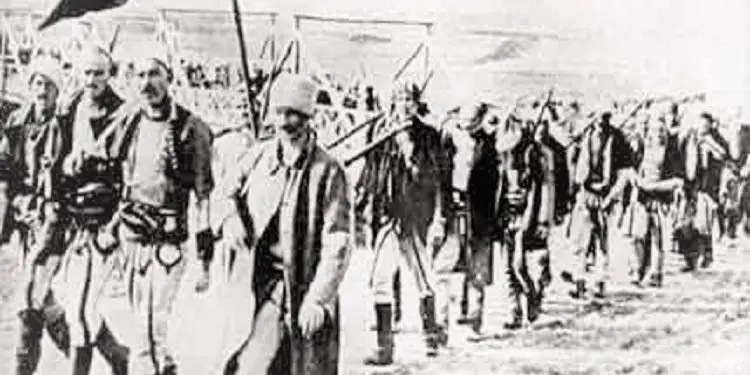
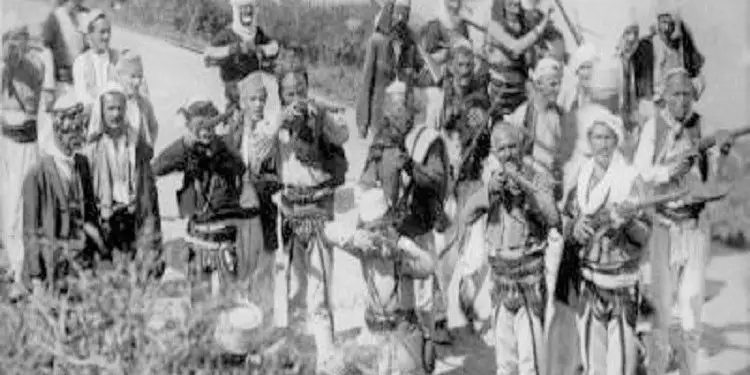
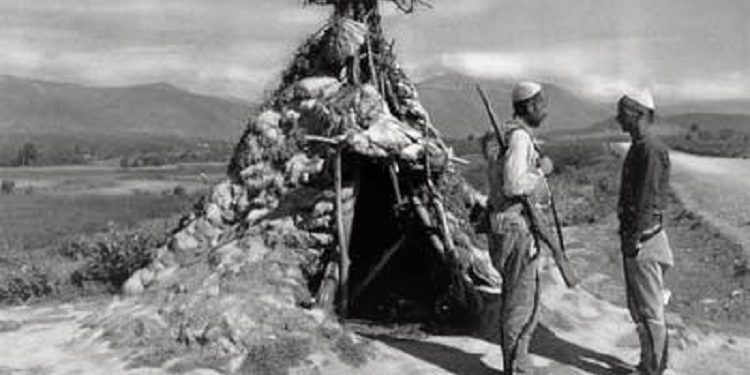
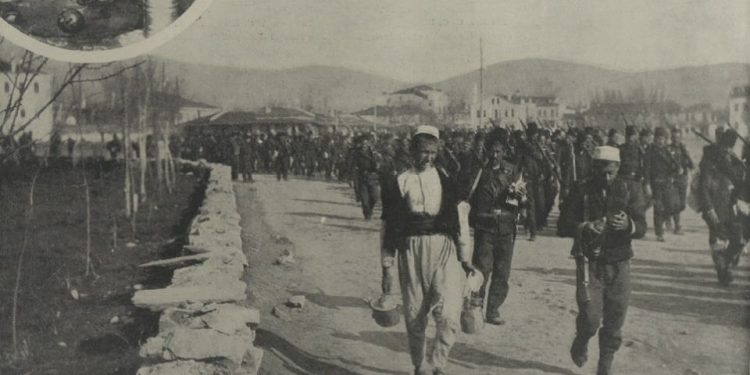
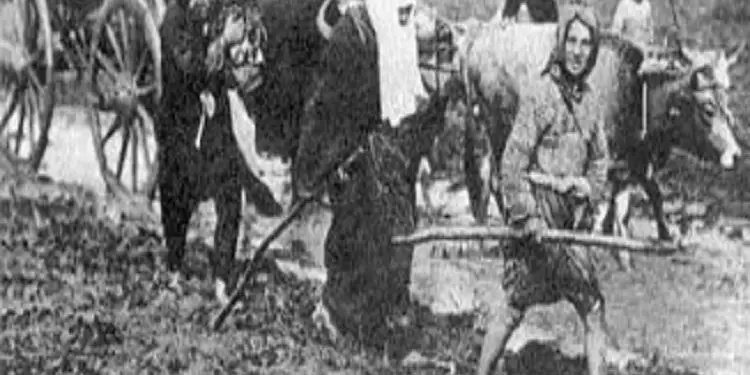
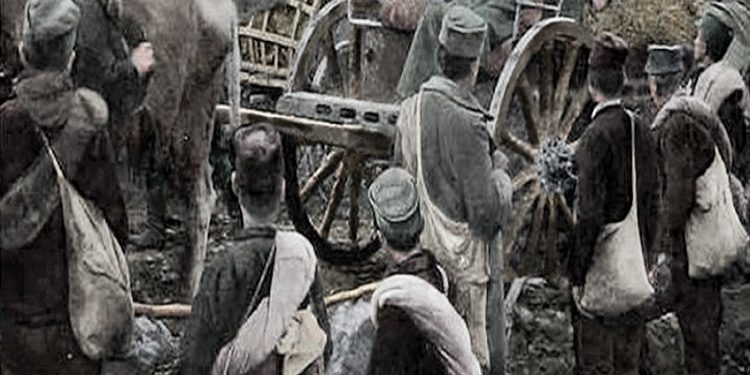
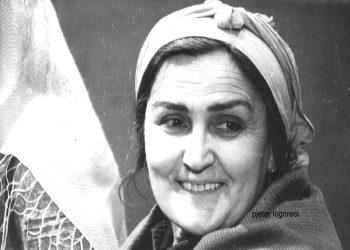
![“When the party secretary told me: ‘Why are you going to the city? Your comrades are harvesting wheat in the [voluntary] action, where the Party and Comrade Enver call them, while you wander about; they are fighting in Vietnam,’ I…”/ Reflections of the writer from Vlora.](https://memorie.al/wp-content/uploads/2025/06/admin-ajax-4-350x250.jpg)


